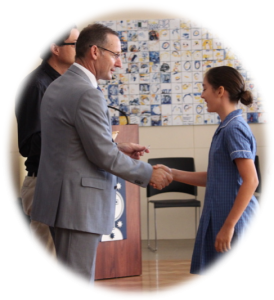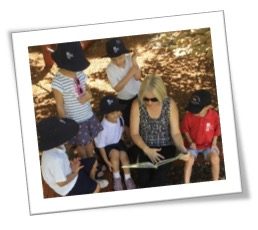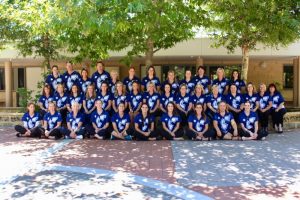

Principal’s Report – Issue 6
Dear Parents
It’s Thursday of Week 6 and the countdown to the Easter break is now in earnest. Given we are over half way through this first term, it’s at this point that one realises the true breadth of the educational experience available to children these days. Our curriculum is bursting at the seams with educational opportunities happening in the physical, emotional, social and spiritual domains, not just the narrower cognitive domain of previous generations. We provide our children with Foundations for Life-Long Leaning – a gift just as important as the three ‘R’s.
Schools are busy places, but more often than not, what happens outside of school hours influences the education of a child as much, if not more than what’s happening inside the gates. What then, can you as parents do, to assist the school in enabling your child to reap the benefits of such a rich educational experience?
Following are seven ‘habits’ to encourage what may seem small and inconsequential, but will provide children with the building blocks for positive engagement in class.
- Commit to your child going to school every day on time.

One of the most important things you can do to ensure your child has a bright future is to make sure he or she goes to school every day – and gets there on time. Kids spend more time asleep than at school, so we need to maximise every day to get full value.
- Help kids start each day well.
A good night’s sleep, a healthy breakfast and some words of encouragement from you will help set a positive tone for a day of learning. This may mean that you adjust your morning routine so that kids have plenty of time get up, eat and get ready for the day.
- Establish work & study habits.
The most successful students are those that develop regular study habits that suit their lifestyle, their study style and their school’s expectations. Find out the work expectations from your child’s teacher and help them establish a work routine that matches.
- Make sure your child gets enough sleep
Many children and young people are sleep-deprived, which impacts on their well-being and their learning. A good night’s sleep consolidates learning, as well as assists future learning. Children need between 10-12 hours of sleep each day, while teenagers need a minimum of nine hours. Help kids get sufficient sleep by having a regular bed-time and get-up time each day. Have 45-minute wind down time each night and remove screens, iPads and mobile phones from bedrooms.
- Encourage kids to exercise.
Kids today get less exercise than those of past generations, which is an impediment to learning and mental health. Health professionals recommend a minimum of 60 minutes of exercise per day for kids of all ages. Encourage kids to play sport; promote free and active play and look for ways to make moving part of their daily lives.
- Focus on being friendly.
Schools are very social places requiring kids to negotiate many different social situations each day. Encourage kids to be open and tolerant; to be friendly; to be involved in plenty of activities and to be social risk-takers.
- Develop self-help skills.
Successful students are often well-organised, self-directed and self-motivated. You can foster organisational skills and self-direction by developing simple, age-appropriate self-help skills related to their everyday lives. Skills such as making lunches, packing school bags, and organising after school schedules can be great lessons that impact on how kids perform at school.
Good Manners
One of our focuses at Infant Jesus School is to use Good Manners. The staff are constantly reminding the students about the use of their ‘Manners’ at school and at home.
Whether we like it or not, people will judge our children on how they handle themselves in the public forum. It’s much easier to teach good manners while our children are young, than it is to break bad habits when they are older. It is important that children are taught to use appropriate manners in all situations for example:
- Waiting their turn and not interrupting other people when they are speaking.
- No name calling. Even if it’s in “fun”, name calling hurts.
 Always greeting someone politely.
Always greeting someone politely.- Saying, “Please” and “Thank you” often. It shows respect and appreciation.
- Learning to take turns – putting other people first.
- Cleaning up after themselves. It is their mess, so they need to clean it up.
- Opening doors for others. When going into buildings, allow elders to go first and open the door for them.
- Respecting differences. When people do things differently from your family because of diversity in culture, race, or religion, then this needs to be respected.
- Recognise and appreciate the efforts that people make for them.
Consideration is the most important idea behind all good manners. Almost always, being considerate is being ‘well-mannered’. Consideration is simply thinking about the way the other person feels. Let us continue to make an effort to be considerate of others.
Parent Teacher Meetings
During Week 8 of this term, parents will have the opportunity to meet with their child/ren’s teachers to discuss their progress so far this year. Parents are encouraged to play an active role in the education of their children and these interviews are an ideal forum in which to help enrich the learning opportunities for students and to build partnerships between home and school.
There are many ways parents can find out about their children’s progress at Infant Jesus School and some of these include:
- Formal and informal interviews
- Reports on student performance (in Term 2 and Term 4)
- SeesawPportfolio
- Parent Information Evening at the beginning of the year
- Learning Journeys
- Parent Teacher Interviews

This year we will be trialling Parent Teacher Online (PTO), a web-based online booking system for Parent Teacher interviews. We hope that it will save parents time and be quite easy to use. Using this system, you will be able to book the interview times that suit you best from any internet-connected device. A computer will be available in the Library, during school hours, if you do not have internet access at home or elsewhere. A letter will be sent home tomorrow giving parents further information about the booking procedures for the Parent Teacher Interviews.
Parents and the broader community play a vital role in supporting successful learning outcomes for our children. Research tells us that the most meaningful partnerships are those where schools, parents, students and the community work together to focus on student learning. Parent and community engagement that is effectively focused on student learning can deliver powerful outcomes.
 Lenten Thought
Lenten Thought
Jesus . . . overturned their tables. He told [them],
Take these things out of here! Stop making my Father’s house a marketplace! (John 2: 15,16)
Acts for each day during this week of Lent
Friday:
Try to make everything you say today POSITIVE.
Saturday:
Tell someone special you love them.
Sunday:
A family project—clean the garage or yard.
Monday:
Let someone special in your life know that you
really appreciate all that they do.
Tuesday:
Check your Project Compassion Box. Add to it if you can.
Wednesday:
Pray today, for people who are lonely.

Prayer for the Week
Creator of my life,
renew me: bring me to new life in you.
Touch me and make me feel whole again.
Help me to see your love
in the passion, death and resurrection of your son.
Help me to observe Lent
in a way that allows me to celebrate that love.
Prepare me for these weeks of Lent
as I feel both deep sorrow for my sins
and your undying love for me.
May the Lord bless us,
protect us from all evil
and bring us to everlasting life.
Amen.
Family Mass
A reminder about our Family Mass on Saturday 17 March at Infant Jesus Parish commencing at 6pm. All families are encouraged to attend this Mass as it provides an opportunity for families to take time to pray together and it is yet another way in which we continue to build our school community. Families will be asked to assist with the Mass in small ways, either by reading or assisting with the offertory. The School Choir will be leading the singing.
This Mass will also be the Commitment Mass for our Year 6 students wishing to be Confirmed this year. It would be wonderful to see as many families as possible at this Mass.
Student Ministries
Next week our students in Year 6 will be placed in their respective ministries for this semester. I know each of them are excited about joining their ministry, as well as ‘getting their teeth’ into the work of the ministry. This is a fantastic opportunity for them to show leadership and responsibility around the school. One staff member is responsible for facilitating the children’s involvement in each of these areas.
- Christian Service
- Sustainability Ministry
- Pastoral Care Ministry
- Wellness Ministry
- Public Relations Ministry
We wish all our Year 6 students the very best as they undertake these leadership roles this year.
Wi-Fi and Student Health
It has been brought to my attention that some parents have expressed some concerns about the impact of the school Wi-Fi on student health. A good question? So, we did some research and asked some of the experts within our system. I have included some information below taken from three articles that might shed some light and clarify the difference between “acute” exposure and “low-intensity” exposure. It is pleasing to note that the Australian exposure limit is way, way below the recommended safety limits.
The use of Wi-Fi has increased rapidly in recent years. Through the use of this technology, electronic devices are connected to a computer network wirelessly using radio waves, or radiofrequency (RF) electromagnetic energy (EME), thereby eliminating or reducing the need for network cables. A common example is a laptop connected to the internet using a Wi-Fi modem at home. Wi-Fi access points can also be found in schools and many public areas. People in a Wi-Fi enabled environment will be exposed to low level RF EME from time to time when using the network on computers and also from the access points. There is some public concern about potential health effects associated with RF EME emissions from Wi-Fi in homes, schools and other places.
Is Wi-Fi Regulated in Australia?
The RF EME emissions from Wi-Fi and other wireless devices used for communication are regulated by the Australian Communications and Media Authority (ACMA). The ACMA’s regulatory arrangements require wireless devices to comply with the exposure limits in the ARPANSA RF Standard. The ARPANSA Standard is designed to protect people of all ages and health status against all known adverse health effects from exposure to RF EME. The ARPANSA Standard is based on scientific research that shows the levels at which harmful effects occur and it sets limits, based on international guidelines, well below these harmful levels.
Does Wi-Fi cause any health effects?
It is the assessment of ARPANSA and other national and international health authorities, including the World Health Organiza on (WHO), that there is no established scientific evidence of adverse health effects below current exposure limits.
Wi-Fi devices and access points are low powered, typically 0.1 wa (100 milliwa s). A measurement study conducted by ARPANSA showed that exposure to RF EME from Wi-Fi in schools is much lower than the limit for public exposure specified in the ARPANSA Standard.
What does ARPANSA (Australian Radiation Protection and Nuclear Safety Agency) advise?
On the basis of current scientific information, ARPANSA sees no reason why Wi-Fi should not continue to be used in schools and in other places. However, ARPANSA recognises that exposure to RF EME from Wi-Fi and other wireless devices can be of concern to some parents. ARPANSA will continue to review the research into potential health effects of RF EME emissions from Wi-Fi and other devices in order to provide accurate and up‑to‑date advice.
Did you know:
Wi-Fi is simply a trademarked term meaning IEEE 802.11x
Some other interesting articles on the topic:
https://www.arpansa.gov.au/research/surveys/wi-fi-in-schools-measurement-study
https://www.arpansa.gov.au/understanding-radiation/radiation-sources/more-radiation-sources/wi-fi
https://www.arpansa.gov.au/sites/g/files/net3086/f/legacy/pubs/factsheets/Wi-FiandHealth.pdf
Thought for the Week
Love begins at home, and it is not how much we do… but how much love we put in that action.
(Mother Teresa)


Kind regards
Paul Hille
Principal
#ExpectGreatThings


© Infant Jesus School 2017
17 Smith St, Morley WA 6062
Tel: (08) 9276 1769 | Fax: (08) 9276 2998
Website by Chameleon Logic








